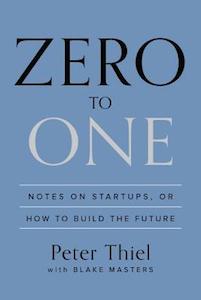Zero to One: Notes on Startups, or How to Build the Future by Peter Thiel and Blake Masters
This book is incomplete and thus unsatisfying. It is a condensed version of Peter Thiel’s Stanford class. It takes less than 4 hours to read, compared to 19 meetings in the classroom. Without context, footnotes, and evidence, the book often comes off as the rambling pontifications of a rich uncle with unpopular views. Thiel espouses a framework that seems more prescriptive than descriptive. The wide range of seemingly disparate topics is fitting for the founder of Palantir.
Thiel certainly does bring up some interesting points, (eg. capitalism and competition are opposites) and I sympathize with his paean for startups to tackle “real” problems. He criticizes the incrementalism of Lean startup methodology, a common point and well taken. Thiel’s view on monopoly is just a provocative repackaging of what we have heard before (ie. define your market). Not all of this is as contrarian as he would have you beleive.
One exercise I did enjoy was tackling “the 7 questions that every business must answer:”
- The Engineering Question: Can you create breakthrough technology, instead of incremental improvements?
- The Timing Question: Is now the right time to start your particular business?
- The Monopoly Question: Are you starting with a big share of a small market?
- The People Question: Do you have the right team?
- The Distribution Question: Do you have a way to not just create, but deliver your product?
- The Durability Question: Will your market position be defensible, ten and twenty years into the future?
- The Secret Question: Have you identified a unique opportunity that others don’t see?
Not having answers to these questions, Thiel advises, your business will run into all sorts of “bad luck.” However, “If you nail all seven, you’ll master fortune, and succeed.”
Prophetic.
Nobody has the map to entrepreneurship, not even Peter Thiel. The conditions are so variable that the journey is different every time. But exercises like these, to get us thinking about our businesses in different ways, are always welcome to the engaged entrepreneur.
There are better books out there to help entrepreneurs with lots of these little exercises. The interesting thing about this book is its (ostensible) author. Between the lines of his philosophic and political meanderings, one gets the sense that Peter Thiel’s political views are more nuanced than his image of Stalwart of Silicon Valley Libertarianism. He even goes so far as to criticize Ayn Rand! However the book only hints at Thiel’s true beleifs, and falls well short of a political manifesto.
This book is only partly about politics, and only partly about entrepreneurship. Such lack of focus lessens its impact overall, making it only partly good. Zero to One‘s shortness is as much a blessing as it is a curse.


